2017年人教版初中英语九年级英语课文知识点同步精讲unit7
人教版九年级英语unit7知识点讲解及同步练习
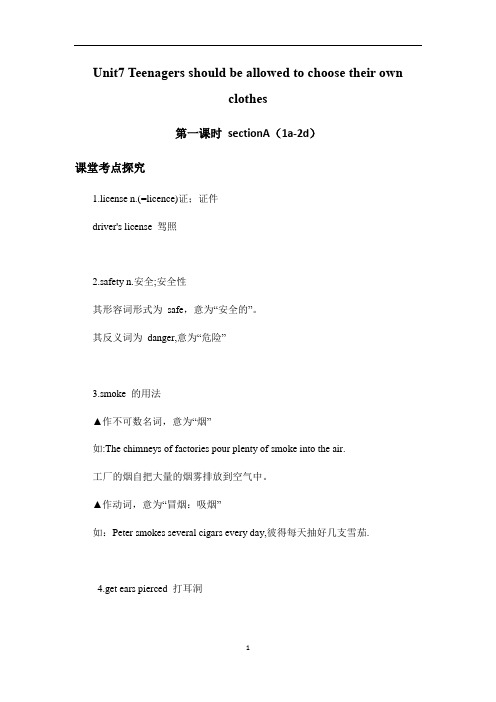
Unit7 Teenagers should be allowed to choose their ownclothes第一课时sectionA(1a-2d)课堂考点探究1.license n.(=licence)证;证件driver's license 驾照2.safety n.安全;安全性其形容词形式为safe,意为“安全的”。
其反义词为danger,意为“危险”3.smoke 的用法▲作不可数名词,意为“烟”如:The chimneys of factories pour plenty of smoke into the air.工厂的烟自把大量的烟雾排放到空气中。
▲作动词,意为“冒烟:吸烟”如:Peter smokes several cigars every day,彼得每天抽好几支雪茄.4.get ears pierced 打耳洞此结构:“get+宾语十宾语补足语(过去分词)"表示“使某事被做:请别人做某事”,其中get 可用have替换。
过去分词表示的动作往往是别人做的,与句子的主语无关。
如:My bike is broken. I will get/have it fixed up tomorrow morning.我的自行车坏了我明天早上找人修理它。
5I don't think sixteen-year-olds should be allowed to drive.我认为十六岁的孩子不应该被允许开车。
▲本句采用了否定前移,真正的否定在后面从句中。
▲sixteen- year-olds 是合成词,表示“十六岁的孩子”,相当于sixteen-year- old children。
合成名词的复数形式通常只将其中的主体名词变成复数。
如:grown-ups成人▲allow“允许;准许”,通常用于以下结构中:allow doing sth.允许做某事allow sb.to do sth.允许某人做某事should be allowed to do sth.应该被允许做某事【注意】含有情态动词的被动语态结构:情态动词+be+动词的过去分词积累词汇·打好基础I.选择方框里的词并用其适当形式填空。
人教版九年级英语第七单元Unit 7 section A+B 知识点精讲

人教版九年级英语第七单元Unit 7 section A+B 知识点精讲Section A单词1.license /'laɪsns/ n.(= licence)证;证件助记li/laɪ/ +cen/sn/+se/s/= license典例driver's license驾照business license营业执照拓展license vt.批准;许可2. safety / 'seɪfti/ n.安全;安全性助记safe(adj.安全的)+y(名词后缀)= safety典例Pay attention to the food safety, please.请注意食品安全联想safely adv.安全地3. smoke / sməʊk/ v.吸烟;冒烟n.烟典例Can I smoke in the dining hall?(动词)我能在餐厅里抽烟吗?Smoke is coming out of the chimney.(名词)烟正从烟囱里冒出来名言No smoke without fire.无风不起浪4.cry /kaɪ/ v.&n.哭;叫喊典例Mom, my little sister is crying all the time.(动词)妈妈,我的小妹妹一直在哭He heard a cry for help and rushed out.(名词)他听到一声呼救声,然后就冲出去了短语cry out大声呼喊5.field/fi:ld/ n.田野;场地典例in the fields在田地里on the football field在足球场上拓展field n.(某一)领域in the field of在…方面,在……领域6.hug /hʌg/ n.&v.拥抱;搂抱典例warm hugs(名词)温暖的拥抱hug tightly(动词)紧紧地拥抱注意hug的过去式和过去分词均为hugged,现在分词为hugging7. lift /lɪft/ v.举起;抬高n.电梯;搭便车典例He was too weak to lift his hand.(动词)他太虚弱了而无法抬起他的手。
【配套K12】人教版初中初三九年级英语第七单元unit7课文重难点知识点详细讲
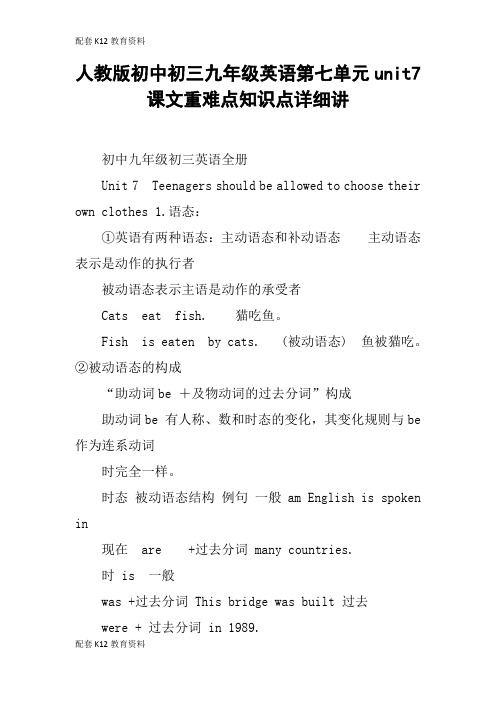
人教版初中初三九年级英语第七单元unit7课文重难点知识点详细讲初中九年级初三英语全册Unit 7 Teenagers should be allowed to choose their own clothes 1.语态:①英语有两种语态:主动语态和补动语态主动语态表示是动作的执行者被动语态表示主语是动作的承受者Cats eat fish. 猫吃鱼。
Fish is eaten by cats. (被动语态) 鱼被猫吃。
②被动语态的构成“助动词be +及物动词的过去分词”构成助动词be 有人称、数和时态的变化,其变化规则与be 作为连系动词时完全一样。
时态被动语态结构例句一般am English is spoken in现在 are +过去分词 many countries.时 is 一般was +过去分词 This bridge was built 过去were + 过去分词 in 1989.时can/should 情态 may +be+The work must be 动词过去分词 done right now. must/…③被动语态的用法当我们不知道谁是动作的执行者,或者没有必要指出谁是动作的执行者,或者只需强调动作的承受者时,要用被动语态。
2. allow sb. to do sth. 允许某人做某事如:Mother allows me to watch TV every night. 妈妈允许我每晚看电视。
be allowed to do sth. 被允许做某事如: Lily is allowed to go to Qinzhou. 莉莉被允许去钦州。
3. get their ears pierced 穿耳洞让/使做某事 get sth. done (过去分词) have sth. done (过去分词)如:I get my car mended. = I have my car mended. 我让别人修好我的车初中九年级初三英语全册初中九年级初三英语全册4. enough 足够形容词+enough 如:beautiful enough 足够漂亮enough+名词如:enough food 足够食物enough to 足够…去做…如:I have enough money to go to Beijing. 我有足够的钱去北京。
【人教版】2017学年度九年级新目标英语:Unit 7 知识点总结
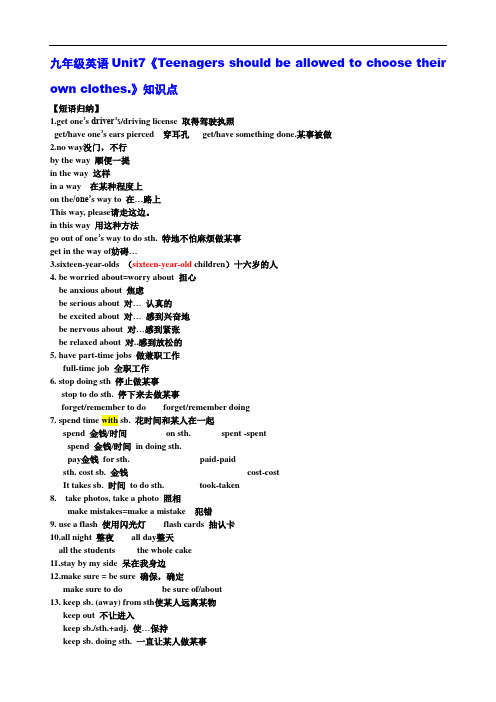
九年级英语Unit7《Teenagers should be allowed to choose their own clothes.》知识点【短语归纳】1.get one’s driver’s/driving license 取得驾驶执照get/have one’s ears pierced 穿耳孔get/have something done.某事被做2.no way没门,不行by the way 顺便一提in the way 这样in a way 在某种程度上on the/one’s way to 在…路上This way, please请走这边。
in this way 用这种方法go out of one’s way to do sth. 特地不怕麻烦做某事get in the way of妨碍…3.sixteen-year-olds (sixteen-year-old children)十六岁的人4. be worried about=worry about 担心be anxious about 焦虑be serious about 对…认真的be excited about 对…感到兴奋地be nervous about 对…感到紧张be relaxed about 对..感到放松的5. have part-time jobs 做兼职工作full-time job 全职工作6. stop doing sth 停止做某事stop to do sth. 停下来去做某事forget/remember to do forget/remember doing7. spend time with sb. 花时间和某人在一起spend 金钱/时间on sth. spent -spentspend 金钱/时间in doing sth.pay金钱for sth. paid-paidsth. cost sb. 金钱cost-costIt takes sb. 时间to do sth. took-taken8. take photos, take a photo 照相make mistakes=make a mistake 犯错9. use a flash 使用闪光灯flash cards 抽认卡10.all night 整夜all day整天all the students the whole cake11.stay by my side 呆在我身边12.make sure = be sure 确保,确定make sure to do be sure of/about13. keep sb. (away) from sth使某人远离某物keep out 不让进入keep sb./sth.+adj. 使…保持keep sb. doing sth. 一直让某人做某事keep/stop/prevent sb. from doing 阻止某人做某事14. hurt oneself 伤害某人自己15. give sb. a hug = hug sb. 拥抱某人n. v.16. lift sb. up 举起某人lift 电梯v. n.17. cough badly 剧烈地咳嗽have a high fever发高烧18. talk back 回嘴19. an adult 一个成人kid-kids child-children20. think back to 回想起look back talk back come back go back get back回头看顶嘴回来回去回来turn back give back bring back take back转身归还带回来带回去21. regret doing sth. 后悔做了某事22. ma ke one’s own decision 做某人自己的决定decide to do sth. = make a decision to do = make up one’s mind to do sth.下定决心做某事23.too + adj.+ to do sth. 太…而不能做某事not… enough toso… that = such… that 如此…以至于The boy is too young to dress himself.The boy is not old enough to dress himself.The boy is so young that he can’t dress himself.He is such a young boy that he can’t dress himself.24. learn…from…从…学到…25. agree with sb 同意某人的观点agree to do sth.disagree with sb. 不同意某人的观点disagree to do sth.agreement--- disagreement n.be in agreement 意见一致26.move out 搬出去27.take (good)care of = look after(well)=care for 照顾28.manage one’s own life 管理自己的生活manage to do sth 努力完成某事try to do sth. 努力做某事try one’s best to do 尽某人最大努力做某事29. that is why 那就是为什么…30. continue to do sth 继续做某事31. take a test参加考试pass the test通过考试fail the test考试不及格fail to do sth.succeed in doingsuccess n. succeed v. successful adj. successfully adv.32. be strict with sb. in sth.在某方面对某人要求严格33. a running star一个跑步明星34. a professional runner一个专业的跑步运动员35. grow up长大grow-grew-grownget/be older36. allow sb. to do sth.允许某人做某事be allowed to do sth. 被允许做……allow doing sth. 允许做……should be allowed to do sth. 应该被允许去做某事37.have nothing against doing sth.We have nothing against running.38.end up with 以…结束end up as 最终成为at the end of-----at the beginning ofin the end=at last=finallyby the end of …39.practice doing sth.练习做某事practice/finish/enjoy/mind/suggest/avoid/consider/stand/allowpay attention to, look forward to, concentrate on, give up, put off…注意盼望,向往集中注意力放弃推迟40.see sb. do sth. 看见某人做了某事see sb doing sth. 看见某人正在做某事hear/see/watch/notice sb. do sth. 变被动还原tohear/see/watch/notice sb. doing sthlet/make/have sb. do sth. 变被动还原to41. care about sb.关心某人42. talk with sb. about sth.和某人谈论某事talk back, have a talk, give a talk, talk show, talk to…顶嘴谈谈作报告脱口秀和..谈43. make a choice做选择choose-chose-chosen44. have a chance to do sth.= have an opportunity to do sth.have a chance of doing sth.= have an opportunity of doing sth.有机会去做某事45. on/at weekends = on/at the weekend在周末46. at that age 在那个年龄段in one’s twenties 在某人20多岁的时候47. on school nights 在上学期间的每个晚上on school days48. stay up (sleep late)熬夜oversleep (get up late)49. clean up (相当与及物动词)清扫Clean-up Day扫除日50. the other day=a few days ago 前几天51. all my classmates 我所有的同学52. concentrate on doing全神贯注于53. be good for 对…有益be bad for对..有害be good/kind/friendly to对.. 友好的be good at=do well in擅长于..be good with 善于应对的54. in groups 成群的,按组55. get/be noisy 吵闹(系表结构)make a noise 吵闹noise-noisy-noisily56. at present 目前,现在【重点句子】57. I don’t think twelve-year-olds should be allowed to get their ears pierced. 我认为不应该允许12岁的孩子穿耳孔。
人教九年级英语unit7知识点
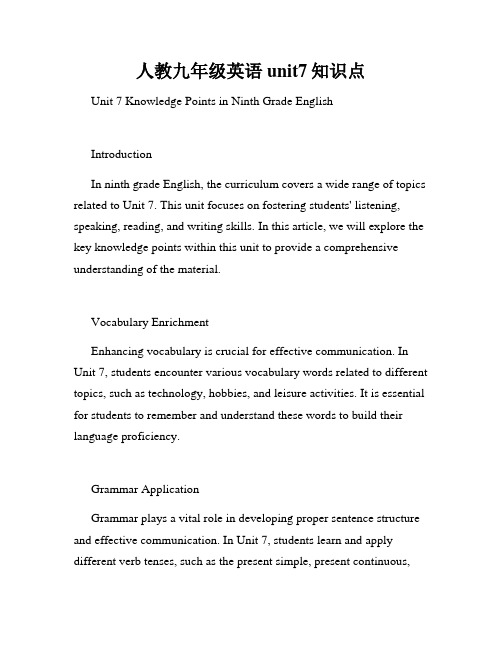
人教九年级英语unit7知识点Unit 7 Knowledge Points in Ninth Grade EnglishIntroductionIn ninth grade English, the curriculum covers a wide range of topics related to Unit 7. This unit focuses on fostering students' listening, speaking, reading, and writing skills. In this article, we will explore the key knowledge points within this unit to provide a comprehensive understanding of the material.Vocabulary EnrichmentEnhancing vocabulary is crucial for effective communication. In Unit 7, students encounter various vocabulary words related to different topics, such as technology, hobbies, and leisure activities. It is essential for students to remember and understand these words to build their language proficiency.Grammar ApplicationGrammar plays a vital role in developing proper sentence structure and effective communication. In Unit 7, students learn and apply different verb tenses, such as the present simple, present continuous,and past simple. Understanding the appropriate usage of these tenses enables students to express ideas accurately and fluently.Reading ComprehensionUnit 7 comprises several reading passages that aim to develop students' reading comprehension skills. These passages cover a wide range of topics, including the effects of technology, travel experiences, and cultural differences. By analyzing and comprehending these texts, students enhance their reading skills while gaining knowledge about the world around them.Listening ComprehensionListening comprehension is an essential aspect of language learning. In Unit 7, students are exposed to various audio materials, such as dialogues, conversations, and monologues. These listening exercises allow students to practice their listening skills, improve their understanding of spoken English, and develop the ability to extract key information.Speaking PracticeUnit 7 also emphasizes the development of speaking skills. Students engage in a variety of activities, such as role-plays, group discussions,and presentations. These exercises enable students to express their thoughts, opinions, and ideas confidently. Additionally, they enhance their ability to communicate effectively in both formal and informal settings.Writing SkillsDeveloping writing skills is an integral part of the curriculum in Unit 7. Students learn different types of writing, such as formal letters, emails, and informal messages. Through guided writing tasks, students practice organizing their ideas coherently, using appropriate language and grammar, and conveying their message effectively in writing.Cultural AwarenessUnit 7 offers opportunities for students to explore cultural awareness. By reading and discussing texts about different cultures, traditions, and customs, students broaden their knowledge and understanding of the diversity in the world. This knowledge fosters empathy and open-mindedness, promoting cultural sensitivity and appreciation.ConclusionIn conclusion, Unit 7 in ninth grade English provides students with valuable knowledge and skills to enhance their language proficiency. From vocabulary enrichment to grammar application, reading comprehension to listening practice, and speaking and writing skills, students are presented with a variety of opportunities to improve their English abilities. Furthermore, the unit fosters cultural awareness and understanding, nurturing well-rounded individuals who can communicate effectively and appreciate the diversity of the world.。
人教版九年级英语Unit7知识点归纳
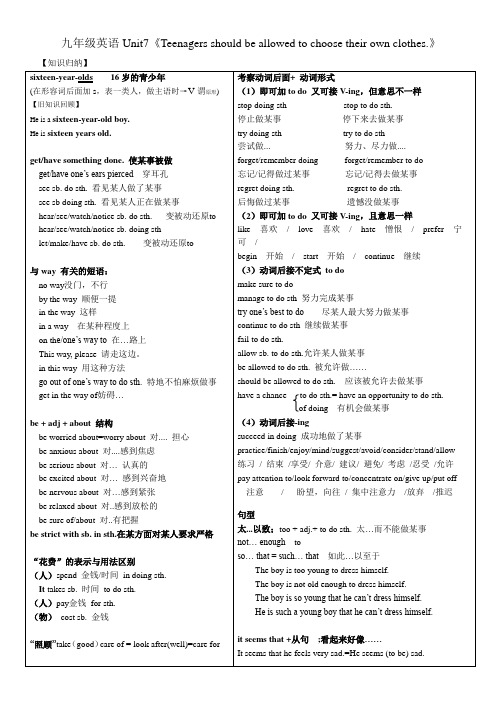
manage to do sth努力完成某事
try one’s best to do尽某人最大努力做某事
continue to do sth继续做某事
fail to do sth.
allow sb. to do sth.允许某人做某事
be allowed to do sth.被允许做……
so… that = such… that如此…以至于
The boy is too young to dress himself.
The boy is not old enough to dress himself.
The boy is so young that he can’t dress himself.
【反义词】disagree with sb.不同意某人的观点
【派生词】n. agreement--- disagreement
be in agreement意见一致
与keep有关的用法
keep sb. (away) from sth使某人远离某物
keep out不让进入
keep sb./sth.+adj.使…保持
at the end of-----at the beginning of
in the end=at last=finally最后
by the end of …
“足够”
形容词+enough(这一点还是比较容易出题的)
如:beautiful enough足够漂亮
enough+名词
如:enough food足够食物
考察动词后面+动词形式
(1)即可加to do又可接V-ing,但意思不一样
人教版九年级英语第七单元知识点总结归纳
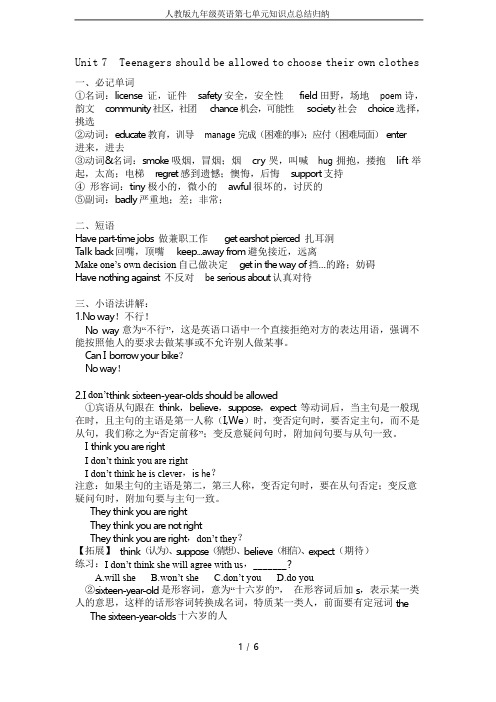
Unit7Teenagers should be allowed to choose their own clothes一、必记单词①名词:license证,证件safety安全,安全性field田野,场地poem诗,韵文community社区,社团chance机会,可能性society社会choice选择,挑选②动词:educate教育,训导manage完成(困难的事);应付(困难局面)enter进来,进去③动词&名词:smok e吸烟,冒烟;烟cry哭,叫喊hug拥抱,搂抱lift举起,太高;电梯regret感到遗憾;懊悔,后悔support支持④形容词:tiny极小的,微小的awful很坏的,讨厌的⑤副词:badly严重地;差;非常;二、短语Have part-time jobs做兼职工作g e t earshot pierced扎耳洞T alk back回嘴,顶嘴keep...away from避免接近,远离Make one’s own decision自己做决定g e t in the way of挡...的路;妨碍Have nothing against不反对be serious a bou t认真对待三、小语法讲解:1.No way!不行!No way意为“不行”,这是英语口语中一个直接拒绝对方的表达用语,强调不能按照他人的要求去做某事或不允许别人做某事。
Can I borrow your bike?No way!2.I don’t think sixteen-year-olds should be allowed①宾语从句跟在think,believe,s u ppos e,expect等动词后,当主句是一般现在时,且主句的主语是第一人称(I,We)时,变否定句时,要否定主句,而不是从句,我们称之为“否定前移”;变反意疑问句时,附加问句要与从句一致。
I think you are rightI don’t think you are rightI don’t think he is clever,is he?注意:如果主句的主语是第二,第三人称,变否定句时,要在从句否定;变反意疑问句时,附加句要与主句一致。
人教版九年级英语unit7知识点总结
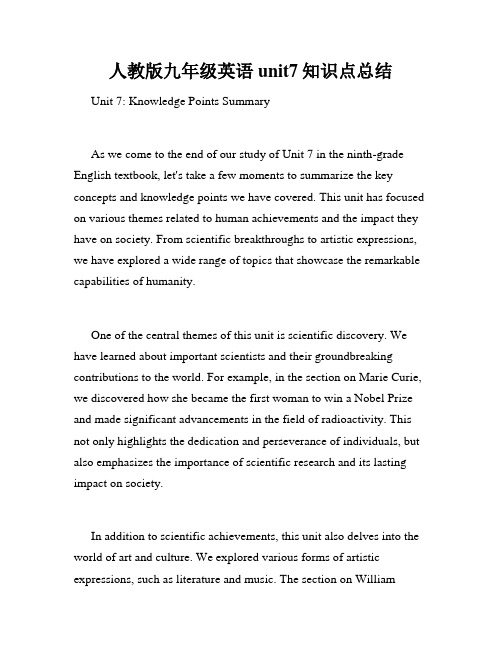
人教版九年级英语unit7知识点总结Unit 7: Knowledge Points SummaryAs we come to the end of our study of Unit 7 in the ninth-grade English textbook, let's take a few moments to summarize the key concepts and knowledge points we have covered. This unit has focused on various themes related to human achievements and the impact they have on society. From scientific breakthroughs to artistic expressions, we have explored a wide range of topics that showcase the remarkable capabilities of humanity.One of the central themes of this unit is scientific discovery. We have learned about important scientists and their groundbreaking contributions to the world. For example, in the section on Marie Curie, we discovered how she became the first woman to win a Nobel Prize and made significant advancements in the field of radioactivity. This not only highlights the dedication and perseverance of individuals, but also emphasizes the importance of scientific research and its lasting impact on society.In addition to scientific achievements, this unit also delves into the world of art and culture. We explored various forms of artistic expressions, such as literature and music. The section on WilliamShakespeare introduced us to his timeless plays and their enduring relevance. We examined his use of language and rhetorical devices, deepening our appreciation for his literary genius.Furthermore, this unit emphasized the importance of environmental awareness and global issues. We discovered the devastating effects of climate change and the urgent need for sustainable practices. Through thought-provoking texts and discussions, we were encouraged to reflect on our own responsibilities as global citizens. It is only through understanding and action that we can hope to preserve and protect our planet for future generations.Another essential aspect of this unit was our exploration of personal character traits and qualities. Through stories and articles, we examined the importance of traits such as perseverance, courage, and resilience. These traits not only contribute to individual success but also shape the fabric of society as a whole. They inspire us to overcome challenges and strive for excellence.The unit also introduced us to the concept of global interconnectivity and the role of technology in promoting communication and collaboration. We learned about the advantages and disadvantages of social media and its impact on our daily lives.This knowledge equipped us with the skills needed to navigate the digital world responsibly and make informed choices.In summary, Unit 7 has provided us with a comprehensive understanding of various aspects of human achievement and their significance in society. From scientific discoveries to artistic expressions, environmental awareness to personal character traits, this unit has broadened our horizons and encouraged us to think critically about the world around us. As we move forward, let us apply the knowledge and skills gained in this unit to make a positive difference in our lives and the world we live in.。
人教版九年级英语第七单元知识讲解

⼈教版九年级英语第七单元知识讲解Unit 7 Teenagers should be allowed to choose their own clothes.词句精讲精练【词汇精讲】1. choosechoose作动词,意为“选择,挑选”,后接宾语,常⽤搭配如下:choose sth. for sb. 为某⼈选择某物;choose sb. to do sth. 选择某⼈做某事;choose + wh从句(where,what,when等引导的特殊疑问句)例如:We have chosen a birthday present for you. 我们已经为你选择了⼀个礼物。
I’d like to choose Jim to go there with me. 我选择吉姆和我⼀起去。
Our teacher will let us choose where we should have our picnic.我们⽼师要我们选择哪⼉野炊。
2. chance(1)chance表⽰“机会”,是可数名词,要表⽰“做某事的机会”,其后可接to do sth. 或of doing sth.。
例如:It is a good chance to study English. 这是学习英语的好机会。
I have a chance of going to Beijing. 我有机会去北京。
(2)表⽰“希望”、“可能性”,可⽤作可数名词或不可数名词。
要表⽰“做某事的可能性”,通常后接“of doing” 形式。
例如:He has a good chance of winning. 他很有希望获胜。
There is still chance that you will pass the exam.你考试及格还是有希望的。
(3)⽤于by chance, 意为“偶然地”、“⽆意中”。
例如:He met her by chance. 他是偶然遇到她的3. manage(1) 作动词,意为“管理;经营;处理”。
人教版九年级英语第七单元知识点归纳
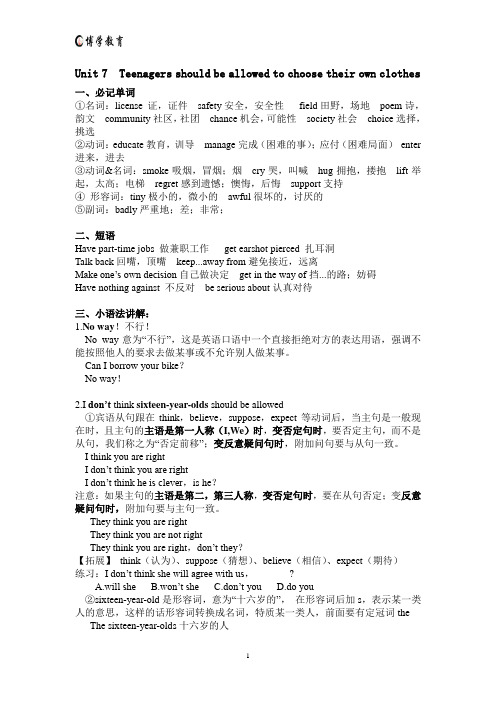
Unit 7 Teenagers should be allowed to choose their own clothes一、必记单词①名词:license 证,证件safety安全,安全性field田野,场地poem诗,韵文community社区,社团chance机会,可能性society社会choice选择,挑选②动词:educate教育,训导manage完成(困难的事);应付(困难局面)enter 进来,进去③动词&名词:smoke吸烟,冒烟;烟cry哭,叫喊hug拥抱,搂抱lift举起,太高;电梯regret感到遗憾;懊悔,后悔support支持④形容词:tiny极小的,微小的awful很坏的,讨厌的⑤副词:badly严重地;差;非常;二、短语Have part-time jobs 做兼职工作get earshot pierced 扎耳洞Talk back回嘴,顶嘴keep...away from避免接近,远离Make one’s own decision自己做决定get in the way of挡...的路;妨碍Have nothing against 不反对be serious about认真对待三、小语法讲解:1.No way!不行!No way意为“不行”,这是英语口语中一个直接拒绝对方的表达用语,强调不能按照他人的要求去做某事或不允许别人做某事。
Can I borrow your bike?No way!2.I don’t think sixteen-year-olds should be allowed①宾语从句跟在think,believe,suppose,expect等动词后,当主句是一般现在时,且主句的主语是第一人称(I,We)时,变否定句时,要否定主句,而不是从句,我们称之为“否定前移”;变反意疑问句时,附加问句要与从句一致。
I think you are rightI don’t think you are rightI don’t think he is clever,is he?注意:如果主句的主语是第二,第三人称,变否定句时,要在从句否定;变反意疑问句时,附加句要与主句一致。
人教九年级英语U7知识点

人教九年级英语U7知识点Unit 7 Knowledge Points in Ninth Grade English (人教九年级英语U7知识点)In the ninth grade English curriculum, Unit 7 covers various knowledge points that are important for students to understand and apply. This unit focuses on vocabulary, grammar, and reading comprehension skills, all of which are integral to effective communication in English. Let's delve into some of the key points covered in this unit.Vocabulary Enrichment:Unit 7 introduces new vocabulary related to travel and transportation. Students will learn words like "accommodation," "destination," and "itinerary." These terms are essential for describing travel plans, discussing vacation experiences, and navigating unfamiliar locations. Understanding and practicing the correct usage of these words will greatly enhance students' written and spoken English skills.Phrasal Verbs:Phrasal verbs are an important aspect of English grammar, and this unit reviews and expands upon the students' knowledge of these verbs.Phrasal verbs consist of a main verb and one or more particles (prepositions or adverbs), such as "give up," "pick up," and "take off." Understanding the correct meaning and usage of these phrasal verbs is crucial for fluent communication in English.Modal Verbs:Modal verbs play a significant role in expressing ability, possibility, permission, and necessity. In Unit 7, students will revisit modal verbs like "can," "could," "may," and "must." These verbs enable learners to communicate their intentions, make requests, and express obligations. Correctly using modal verbs can enhance the clarity and accuracy of students' speech and writing.Reading Comprehension Skills:Unit 7 also focuses on the development of reading comprehension skills through a variety of engaging texts. Students will have the opportunity to read articles and narratives related to travel, such as travel guides, personal experiences, and tourist brochures. These texts provide valuable practice in understanding context, identifying key information, and inferring meaning from unfamiliar words or phrases.Grammar in Context:To reinforce grammar concepts, grammar exercises in Unit 7 are presented in authentic contexts, such as travel itineraries, emails, and dialogues. By placing grammar points in real-life situations, students can better understand how to apply these rules effectively. This approach enhances students' overall language proficiency and helps them develop a deeper understanding of grammar rules and structures.Speaking and Writing Tasks:Unit 7 includes interactive speaking and writing tasks to enable students to practice and apply the newly acquired knowledge. Students engage in role plays, discussions, and presentations, where they employ the vocabulary, grammar, and reading comprehension skills covered in the unit. These tasks encourage students to express their ideas, opinions, and experiences related to travel and transportation.In conclusion, Unit 7 of the ninth-grade English curriculum covers various knowledge points that are essential for students to become proficient in English. From vocabulary enrichment to grammar rules, reading comprehension to speaking and writing tasks, this unit offers a comprehensive approach to language learning. By understanding and applying these knowledge points effectively, students can enhance their English proficiency and become better communicators.。
人教版九年级英语unit7知识要点
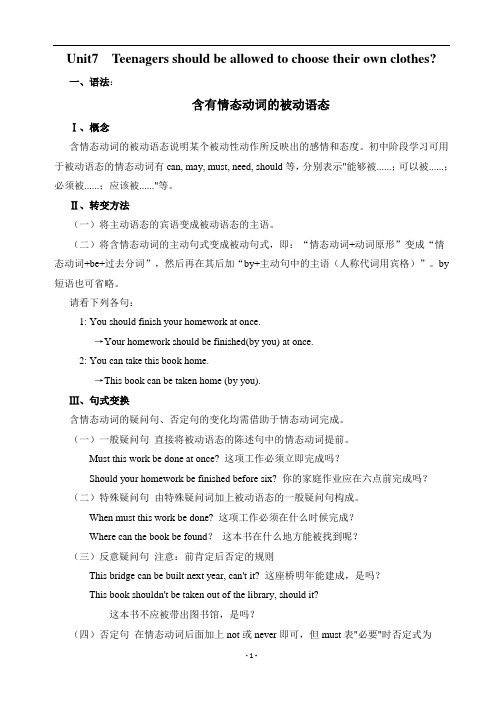
Unit7 Teenagers should be allowed to choose their own clothes?一、语法:含有情态动词的被动语态Ⅰ、概念含情态动词的被动语态说明某个被动性动作所反映出的感情和态度。
初中阶段学习可用于被动语态的情态动词有can, may, must, need, should等,分别表示"能够被......;可以被......;必须被......;应该被......"等。
Ⅱ、转变方法(一)将主动语态的宾语变成被动语态的主语。
(二)将含情态动词的主动句式变成被动句式,即:“情态动词+动词原形”变成“情态动词+be+过去分词”,然后再在其后加“by+主动句中的主语(人称代词用宾格)”。
by 短语也可省略。
请看下列各句:1: You should finish your homework at once.→Your homework should be finished(by you) at once.2: You can take this book home.→This book can be taken home (by you).Ⅲ、句式变换含情态动词的疑问句、否定句的变化均需借助于情态动词完成。
(一)一般疑问句直接将被动语态的陈述句中的情态动词提前。
Must this work be done at once? 这项工作必须立即完成吗?Should your homework be finished before six? 你的家庭作业应在六点前完成吗?(二)特殊疑问句由特殊疑问词加上被动语态的一般疑问句构成。
When must this work be done? 这项工作必须在什么时候完成?Where can the book be found?这本书在什么地方能被找到呢?(三)反意疑问句注意:前肯定后否定的规则This bridge can be built next year, can't it? 这座桥明年能建成,是吗?This book shouldn't be taken out of the library, should it?这本书不应被带出图书馆,是吗?(四)否定句在情态动词后面加上not或never即可,但must表"必要"时否定式为needn't。
【人教版】九年级英语课文单词知识点精讲第七单元ppt
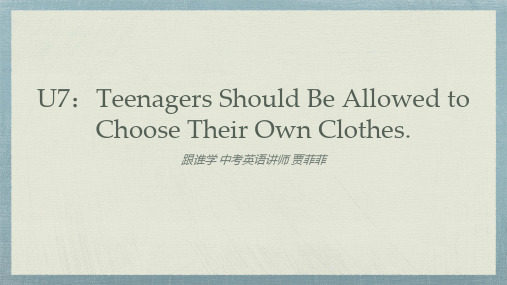
society n. 社会 Everyone works hard in today’s society. get in the way of 挡······的路;妨碍 He wouldn’t allow emotions to get in the way of his job. support v. & n. 支持 I need your advice and support. enter v. 进来;进去 The students entered the classroom one by one. choice n. 选择;挑选 You have no other choice but to read it.
enough用法 adj.+enough 足够如何 The room is big enough for us to live. enough+n. 足够的东西 I have enough time to finish my homework.
regret doing sth.后悔做过 regret to do sth. 遗憾要做 I regret telling you the secret. I regret to tell you that you failed the exam.
寒假 暑假
精品文档 欢迎下载
读书破万卷,下笔如有神--杜甫
cry v. &n. 哭;喊叫 The baby was crying for its mother. field n. 田野;场地 People were working in the fields. hug n. & v. 拥抱;搂抱 They hugged and cried. lift v. 举起;抬高 n. 电梯;搭便车 He lifted his eyes from the book. badly adv. 严重地;差;非常 I slept very badly last night. talk back 回嘴;顶嘴 Don’t talk back to your mom.
人教版九年级英语Unit 7课本知识点集锦

九年级英语Unit 7 Teenagers should be allowed to choose their ownclothes.课本知识点集锦P49☆be allowed to do sth 被允许做某事(被动语态)Lily is allowed to go to Qinzhou. 莉莉被允许去钦州。
拓展:allow sb. to do sth. 允许某人做某事(主动语态)allow doing sth. 允许做某事Mother allows me to watch TV every night. 妈妈允许我每晚看电视。
☆driver’s license 驾照☆No way! 没门!☆be worried about 为……而担心☆part-time job 兼职工作☆get one’s ears pierced 打耳洞让/使(别人)做某事get sth. done(过去分词)have sth. doneI get my car made. = I have my car made. 我让别人修好我的车☆enough 足够形容词+enough beautiful enough足够漂亮enough+名词enough food 足够食物enough to 足够…去做…I have enough money to go to Beijing. 我有足够的钱去北京。
She is old enough to go to school.她够大去读书了。
P50☆stop doing sth. 停止做某事Please stop speaking.请停止说话。
stop to do sth. 停止下来去做某事Please stop to speak. 请停下来说话。
☆seem to do sth. 似乎/ 好像做某事看起来好像…sb. seem to do sth.it seems that +从句He seems to feel very sad.It seems that he feels very sad. 他看起来好像很伤心。
Unit7重点知识人教版九年级英语全册
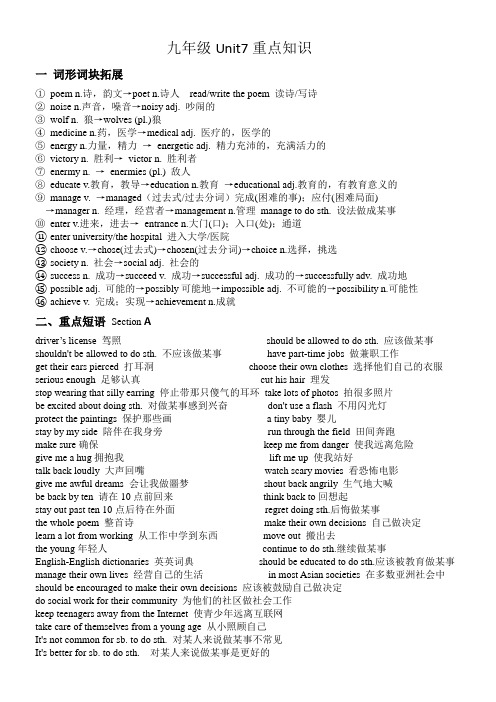
九年级Unit7重点知识一词形词块拓展①poem n.诗,韵文→poet n.诗人read/write the poem 读诗/写诗②noise n.声音,噪音→noisy adj. 吵闹的③wolf n. 狼→wolves (pl.)狼④medicine n.药,医学→medical adj. 医疗的,医学的⑤energy n.力量,精力→energetic adj. 精力充沛的,充满活力的⑥victory n. 胜利→victor n. 胜利者⑦enermy n. →enermies (pl.) 敌人⑧educate v.教育,教导→education n.教育→educational adj.教育的,有教育意义的⑨manage v. →managed(过去式/过去分词)完成(困难的事);应付(困难局面)→manager n. 经理,经营者→management n.管理manage to do sth. 设法做成某事⑩enter v.进来,进去→entrance n.大门(口);入口(处);通道⑪enter university/the hospital 进入大学/医院⑫choose v.→chose(过去式)→chosen(过去分词)→choice n.选择,挑选⑬society n. 社会→social adj. 社会的⑭success n. 成功→succeed v. 成功→successful adj. 成功的→successfully adv. 成功地⑮possible adj. 可能的→possibly可能地→impossible adj. 不可能的→possibility n.可能性⑯achieve v. 完成;实现→achievement n.成就二、重点短语Section Adriver’s license 驾照should be allowed to do sth. 应该做某事shouldn't be allowed to do sth. 不应该做某事have part-time jobs 做兼职工作get their ears pierced 打耳洞choose their own clothes 选择他们自己的衣服serious enough 足够认真cut his hair 理发stop wearing that silly earring 停止带那只傻气的耳环take lots of photos 拍很多照片be excited about doing sth. 对做某事感到兴奋don't use a flash 不用闪光灯protect the paintings 保护那些画 a tiny baby 婴儿stay by my side 陪伴在我身旁run through the field 田间奔跑make sure确保keep me from danger 使我远离危险give me a hug拥抱我lift me up 使我站好talk back loudly 大声回嘴watch scary movies 看恐怖电影give me awful dreams 会让我做噩梦shout back angrily 生气地大喊be back by ten 请在10点前回来think back to回想起stay out past ten 10点后待在外面regret doing sth.后悔做某事the whole poem 整首诗make their own decisions 自己做决定learn a lot from working 从工作中学到东西move out 搬出去the young年轻人continue to do sth.继续做某事English-English dictionaries 英英词典should be educated to do sth.应该被教育做某事manage their own lives 经营自己的生活in most Asian societies 在多数亚洲社会中should be encouraged to make their own decisions 应该被鼓励自己做决定do social work for their community 为他们的社区做社会工作keep teenagers away from the Internet 使青少年远离互联网take care of themselves from a young age 从小照顾自己It's not common for sb. to do sth. 对某人来说做某事不常见It's better for sb. to do sth. 对某人来说做某事是更好的Section Bget to class late 上课迟到finish a test early 提前做完检测worry about failing a test 担心考试不及格take a test 参加考试pass the test 通过考试fail a math test 数学考试不及格take the test later 晚点儿参加考试strict rules 严格的规章制度shouldn't not be too strict with teenagers 不应该对青少年太严格get in the way of.....妨碍as much as they want 尽可能多地a fifteen-year-old boy 十五岁男孩on one's school team 在校队want to be a professional runner 想成为一名职业赛跑者achieve his dreams 实现他的梦想support every one of his races 每一场比赛have nothing against doing sth. 不反对做某事think about other possible jobs 其他另外的工作decide for myself 自己做决定end up as a professional runner 最终成为一名职业赛跑者enter university 上大学be serious about doing sth. 对..是认真的have a chance to do sth. 有机会做某事It's hard to do sth. 很难做某事三.知识点② In order to have no _____________,he will try his best to finish what he really wants to do.③—I regret ________ tell you that Mary was badly injured in the accident.—I can hardly believe it. She is always so careful.(盲填)④Tony regretted ________ h e did yesterday. He broke his sister’s favourite glass by mistake, but he didn’t tell her the truth.(盲填)countryside.(盲填)②There will be a safety education lesson this afternoon to educate students ________ how to keep away from the danger of riding bikes by the river.(盲填)③Teachers should educate their students ________ help the old, such as offering seats to them or helping them cross the road.(盲填)④It’s a pity that Jack’s father couldn’t afford ________ education for his son because there wasn’t enough money.(盲填)⑤Parents should educate kids ________ keeping away from smoking and playing too much computer games.(盲填)3.manage的用法manage→manages→managed→managed② My uncle has ________ (manage) this school for 8 years since his parents passed away.③. To be a successful ________ in the future is quite a good job, but it also needs much effort.④Whether a company can develop well or not largely depends on suitable_____________.speech skills.② I always _____________ community se rvice because I think it’s meaningful for us to help others.③. My brother ________ the army five years ago and he is an excellent soldier now.④The girl likes to ________ all kinds of games with other little girls.⑤As students, we should take ________ active part in school activities. It will make our school life more colorful.(盲填)⑥. Look, they are playing the card game. I’m so interested in it and let’s join ________ it.(盲填)四.重点句子① Teenagers should not be allowed to smoke. 不应该允许青少年吸烟。
九年级unit7知识点

九年级unit7知识点九年级Unit 7知识点Unit 7是九年级英语教材中的一个重要单元,主要涉及到一些关于节日、文化和传统的知识点。
本文将对该单元的知识点进行详细的介绍。
一、九年级Unit 7单词1. celebration:庆祝活动2. traditional:传统的3. custom:习俗4. global:全球的5. gather:聚集6. symbol:象征7. superstition:迷信8. fortune:财富9. prosperous:繁荣的10. ancestor:祖先二、九年级Unit 7常见短语和句型1. celebrate (a festival):庆祝(节日)2. have a good/bad time:度过愉快/不愉快的时光3. look forward to (doing) something:期待(做)某事4. take part in:参加5. be associated with:与...相关联6. bring good luck:带来好运7. keep (a tradition) alive:保持(传统)的延续8. all over the world:全世界9. believe in:相信10. make a wish:许愿三、九年级Unit 7主要话题1. 节日和庆祝活动:如春节、圣诞节、感恩节等各种节日的来历、庆祝方式和习俗。
2. 传统和习俗:包括传统服饰、食物以及庆典活动等。
3. 文化和传统:各个国家和地区独特的文化和传统。
四、九年级Unit 7相关阅读和听力材料1. 阅读材料:根据提供的内容介绍不同节日的来历、庆祝方式和习俗。
2. 听力材料:通过听取对话和短文,了解不同文化和传统的背景信息。
五、九年级Unit 7写作任务写作任务一:根据指定的节日或庆祝活动,写一篇介绍其来历、庆祝方式和习俗的文章。
写作任务二:根据所学的传统和习俗,写一篇文章,说明你对某一传统或习俗的态度,并解释其重要性。
2017人教版九年级英语全一册第七单元知识点总结

实现某人的梦想
60. have nothing against doing sth.
不反对做某事
have nothing against running不反对跑步
61. end up as +职业作为......而结束
end up with sth./ doing sth
以某事/做某事而结束
62.enter university
63. be serious about
对.....是认真的/对.....极感兴趣
64. practice doing sth.练习做某事
65. do the right thing 66. care about关心
40. do social work做社会工作
41. move out搬出去
42. in many Western countries
在许多西方国家
43.manage one’s own life
应付/处理自己的生活
44.take care of oneself
=look after oneself照顾自己
50.worry about(表动作)担心
be worried about(表状态)担心
51. fail a test考试不及格或失败
反义词:pass a test通过考试
52. take the test later参加补考
53. be strict with sb. in sth
对某人在某方面要求很严格
15.spend time with their friends
和朋友度过时光
16.wear silly earrings
- 1、下载文档前请自行甄别文档内容的完整性,平台不提供额外的编辑、内容补充、找答案等附加服务。
- 2、"仅部分预览"的文档,不可在线预览部分如存在完整性等问题,可反馈申请退款(可完整预览的文档不适用该条件!)。
- 3、如文档侵犯您的权益,请联系客服反馈,我们会尽快为您处理(人工客服工作时间:9:00-18:30)。
2017年人教版初中英语九年级英语课文知识点同步精讲Unit 7: Teenagers should be allowed to choose their own clothes.★重点短语参加考试1、take the testpass the test 通过考试2、考试失败3、fail a test对某事要求严格be strict in+事物4、be strict with+人对某人严格stay up 熬夜5、=have a chance to do/ of doing have an opportunity to do sth.有机会做某事6、(每两天)7、every other day每隔一天整理8、clean up 打扫learn from each other 互相学习9、concentrate on 专注于10、one's own 某人自己的11、the other day 前几天,几天前= a few days ago= every two days 12、现在,目前13、at presentin this way 用这种方法14、in the way 挡道的,妨碍人的15、在路上16、on the way…的路上17、on one's way to 在某人去by the way 顺便说(问)18、…认真、be serious about 对19 care for在乎、关心20、★【语法点】to choose their own clothes. 1. Teenagers should be allowed允许allow allow + n. 允许某事如:我们不允许这样的事(发生)allow sb. to do sth. 允许某人做某事(主动语态)如:妈妈允许我每晚看电视。
allow doing sth. 允许做某事They don't allow smoking here.如:被允许做某事(被动语态)be allowed to do sth.如:莉莉被允许去青岛。
sixteen-year-olds should be allowed to drive. I don't think2.宾语从句中否定转移:常上。
体现在时,为而想,等表示若宾语从句跟在think, believe“认为的动词之后,主语第一人称句子的否定主句1用词有:suppose(猜想), guess(猜、猜测), imagine(想象), expect(期待)如:我认为他不对我认为那不是一个好主意。
3.Sixteen-year-olds should be allowed to get their ears pierced.V. + 宾语+ 宾补get/have + 宾语+ 过去分词请或让某人做某事如:I get my car . == I have my car . 我让别人修好我的车I want to have my hair . 我要理发. I usually get my hair cut once a month.keep sb/ sth. +形容词使某人/某物保持…. 如:We should keep our city clean.Don't keep me for a long time.别让我等得太久。
4. They aren't serious enough.enough 足够形容词+enough 如:beautiful enough She is old enough to go to school.enough+名词如:enough food I have enough money to go to Beijing.enough to do sth.足够…去做…如:She is old enough to go to school.5. He should stop wearing that silly earring.stop 停止、阻止stop doing sth. 停止做某事如:Please stop speaking.stop to do sth. 停止下来去做某事如:Please stop to speak.can't stop doing sth. 忍不住做某事如:I can't stop laughing when I heard it.6. Sb. seems to do sth. = It seems that +从句看起来好像…①He seems to feel very sad. = It seems that he feels very sad.②He doesn't seem to have many friends. =It seems that he doesn't have many friends. =He seems not to have many friends.7. 程度副词:always, usually, sometimes, never等如:I am always/usually/sometimes/never late for school.8. ---We have a lot of rules at my house. 在家里我们有许多规定。
---So do we. 我们也是。
(倒装句)由so+助动词(be/do/will/have)/情态动词+主语意为:…也是一样Neither/Nor + be动词/助动词/情态动词+主语(前为否定) 表示与前面所述事实一致.①She is a student. So am I.②She went to school just now. So did I.③She has finished the work. So have I.④She will go to school. So will he.⑤Tom can't swim. Neither can John.如:Tom has been to Beijing. So have I.He speaks English well.--- So he does. / --- So do you.He can't swim. Neither/ Nor can I.9.go doinggo shopping(去购物) go fishing(去钓鱼) go swimming(去游泳),go boating(去划船) go hiking(去登山) go trekking(去徒步)10. care2take care 留神,小心=be careful,保重如:Take care not to drop it.take care of 照顾,照料=look after如:I took care of my sister well.care about 关心,在乎如:That girl never cares about others.care for 喜欢,照顾,为……操心如:You should care for your sick mother.10.be serious about doing对…热衷,对…兴趣如:She is serious about dancing.be serious about sth.如:She is serious about him. 她对他感兴趣。
12. sleep n./v. 睡觉I sleep for 7 hours every day.asleep adj. 睡着的,睡熟的表状态不能在名词之前She is asleep in the bed.sleepy adj. 想睡觉的,困乏的I'm sleepy, I want to go to bed.sleeping adj. 睡着的,正在睡觉的在名词之前This is a sleeping dog.13.agree to + 建议、计划、安排等名词agree with + 人、表示意见的词agree on + 具体协议的文件、行动等名词agree to do 同意做某事14. have +时间段+off 放假,休息如:have 2 days off off 不工作,不上班,不上学,不值班.例: I think I'll take the afternoon off.She is off today.I have three days off next week.They haven't had a day off since last week.3★单项选择( ) 1. ---Look at the sign on the right. ---Oh, smoking here.A. doesn't allowB. isn't allowedC. didn't allowD. wasn't allowed( ) 2. If people cutting down the forest, they will have nowhere .A. keep, to live inB. will keep, to live inC. keep, to liveD. will keep, to live ( ) 3.Lucy speaks English . She can talk to the guests from the USA.A. enough goodB. enough wellC. good enoughD. well enough( ) 4. Mr. Black, can you tell me the best way a foreign language?A. learnB. learningC. of learnD. to learn ( ) 5. It's very hot in the room. Would you please keep the window .A. openB. opensC. to openD. close( ) 6. James, I'm too tired. Let's stop a rest .A. havingB. haveC. to havingD. to have( )7. Can we agree a date for the next meeting?A. toB. onC. withD. of( )8. The twins are good at. They are both in the club.A. run, runB. runs, runningC. run, ranD. running, running ( ) 9. We don't agree them, but we agree the plan.A. with, withB. to, toC. with, toD. to, with( )10. Tom agreed friends with me.A. makeB. makesC. makingD. to make()11. I don't your opinion.A. care aboutB. care forC. take care ofD. take care()12. when you cross the road.A. Care aboutB. Care forC. Take care ofD. Take care()13.---I have read the book before. ---Me, too. (选出与划线部分意思相同的一项)A. We are the sameB. So have IC. Also ID. Neither have I★提高篇( ) 1.—Jim enjoys listening to pop music. —.A. So does Helen.B. Also is HelenC. Helen likes alsoD. So Helen does( ) 2. Our English teacher is very strict _______ us and he is strict _________his teaching.A. with, atB. with, withC. at, atD. with, in( ) 3. —What's the matter?—They said I should not be allowed here. They don't allow __in the waiting room.A. smoking, to smokeB. to smoke, smokeC. to smoke, smokingD. smoking, smokingdo his homework ______________, though he has ______________. ) 4. He ( doesn't4A. carefully enough, enough timeB. enough carelessly, time enoughenough time C. carelessly enough, enough time D. enough carefully,) 5. The little child was too _____________ to hear the end of the long speech. (A. sleepyB. asleepC. sleepD. sleeping) 6. Everyone ____________to have at least eight__________sleep at night. (hours' hour's D. needs, A. needs, hour's B. need, hours' C. needed, ( ) 7. We should go to school at 8:00 ______________ school mornings.A. atB. inC. onD. of( ) 8. Something is wrong with my PDA.I will get it _____ .A. repairB. repairingC. to repairD. repairedsorry, here you go. Excuse me, you are _________ of my passing through. ——I'm( ) 9. —— A. on the way B. in the way C. out the way D. off the wayfinish the homework,_________. ) 10. Jill didn't(A. eitherB. tooC. alsoD. neither)11. You must concentrate more _________ your English. (A. toB. inC. onD. at) 12. That is a good way to keep _____ teachers and students happy. (A. eitherB. noneC. allD. bothget_________ when you study in groups. ( )13. Don't A. noise B. noises C. noisy D. noising) 14. We should learn _________ each other. (A. toB. fromC. forD. of( ) 15. The children often take time to do things like_________.A. volunteerB. to volunteerC. volunteersD. volunteering【用所给词适当形式填空】1. People are not ( allow) to smoke in some public places.2. My parents didn't use to allow (watch) TV on weekdays.But I was (watch) TV on Sundays.3. Our TV doesn't work at all. I am going to get it (repair).4. When did you get your hair (cut).5. He got me (help) him.【句型转换】1. Teenagers should be allowed to wear that earring.(否定句)Teenagers to wear that earring.2. He should allow you to make your own decision. (被动语态)You should to make your own decision.★短文填空AEveryone knows that exercise is important . We all need to exercise . Doctors say ①is good for us . It makes yourheart and body ②. Children who often exercise are more alert (灵活的). This means they do better in testsand schoolwork than those who don't exercise .5There are many ③to exercise . You can walk , run , swim , skate , or play ball games . Make sure you e④in the following ways : you have to like what you're doing . Exercise enough - but not too⑤. It's best toexercise ⑥each week . Thirty minutes each time is enough . Try all kinds of things until you find one , two or eventhree sports that feel ⑦for you .You can exercise at fitness centers (健身中心). They have ⑧of equipment (设备)there . The equipmentwill help exercise your arms , legs and other parts of your body to make you ⑨. Some people buy equipment fortheir homes . But it is very expensive .Exercising can be fun . Friends can exercise ⑩at a fitness center , or they can play sports together . Howdo you exercise ?BClimbing a mountain is hard work. But one step after another finally brings a person to the①. Along the way,he can stop and look around. And the higher he climbs, the ②wonderful his view (视野) is. If he keeps③, he will have a new world before him. He will have a new way of seeing④.Now learning another language is something like climbing ⑤. This new language can give you a new view⑥life. And it is more than a look at the surface (表面) of things. It can open the way into people's minds and⑦, into a culture (文化) very different from the one of your ⑧. This will make you richer, richer inthings that money can't buy. Even though you never set foot on a ship or a plane, you can be an armchair tourist throughbooks.Like the mountain climber who stops now and then to ⑨the scenery around him, everyone who isinterested in ⑩will find pleasure in books as he fights on to learn more and more of that new language.1. it2. strong3. ways4. exercise5. much6. twice7. right8. lots9. fit 10. together第(30)组:1. top 2. more 3. climbing 4 everything. 5. mountain. 6. of 7. hearts 8. own 9. enjoy★考前热身()1、the old man in this factory when he was young?A、Did ,used to workB、Did ,used to workingC、Did ,use to workD、Did ,use to working()2、-It's very cold here in this room. -.A、so it isB、so it doesC、so does itD、so is it()3、He hardly has time for concerts , he ?A、don'tB、doesn'tC、doesD、do()4、The students were allowed here for a little longer timeA、stayingB、to stayC、stayedD、to staying( )5. The missing boys were last seen ______ near the river.A. playingB. to be playingC. playD. Played( ) 6.---. ____ good time we had at the party last night!---Yes. It was ____ exciting party that I would never forget it.A. What; soB. How; suchC. What a; such anD. How a; so an( )7.. —what a new computer! Can you tell me _________?___Just the day before yesterday.A, how much you paid for it B. how much did you pay for itC. when you bought itD.when did you buy it.( )8. —James, can you tell me ______?—Paul? I haven't seen him for years. He used to be a shy and quiet boy.6A. what is Paul likeB. what Paul is likeC. what does Paul likeD. what Paul likes( )9. —Mr Lee said he ______ teaching English because he loved children.—Yes. And his love for children and teaching makes him a great teacher.A. turned upB. gave upC. took upD. set up( )10. —I have got used to living in this city. But I still miss my old friends in Taiyuan______.—Old friends are best, right?A. in timeB. at the same timeC. from time to timeD. on time( )11.The number of speaking Chinese ______ larger than ____ of those speaking English in the world .A are, that B. are, one C. is , that D. is ,those( )12.---How do you study for a test ?--- ______working with friends.A. ByB. WithC. OnD. At( )13. ______he explained, ______we understood.A. The more, betterB. The more , the bestC. The more, the betterD. The best, the better( )14.--- May I______your pen ? ______is broken. --- Sure.A. borrow; MyselfB. use; MyC. borrow; MineD. lend; Mine( )15.--- Shall we go for a picnic tomorrow ?---- Well, it all ______ the weather .A. belongs toB. depends onC. happens toD. concentrate on( )16.--- How long could I your bike ? ---For two days.A. borrowB. lendC. getD. keep( )17.---What do you often do when you meet a new word in the reading?--- I will______it _______ in a dictionary when I can't guess its meaning .A. look ;upB. look ;throughC. look ;overD. look; out( )18.The policeman asked the driver _______.A. when the accident happenedB. when did the accident happenC. the accident when happenedD. when happened the accident( )19. —Excuse me, is there a post office near here?—_______ I can't hear clearly.A. What's the matter with you?B. I beg your pardon?C. What's up?D. What's wrong?( )20. —I ________ speak English in class because I'm afraid of making mistakes.—Don't be shy. Believe in yourself and everything will be OK.A. needn'tB. dare notC. dare not toD. needn't to★完型填空Food is very important .Everyone needs to 51 well if he or she wants to have a strong body. Our minds also need akind of food .This kind of food is 52 .We begin to get knowledge even when we are very young .Small to get knowledgeeven when we are very young .Small children are 53 in everything around them .They learn 54 while they are watchingand listening .When they are getting older ,they begin to 55 story books ,science books …,any thing they like .When theyfind something new ,they love to ask questions and 56 to find out the answers .What is the best 57 to get knowledge ? If we learn 58 ourselves ,we will get the most knowledge .If we are 59getting answers from others and do not ask why , we will never learn well .When we study in the right way , we will earn more7and understand 60 .()21、A、sleep B、read C、drink D、eat()22、A、sport B、exercise C、knowledge D、meat()23、A、interested B、interesting C、weak D、better()24、A、everything B、something C、nothing D、anything()25、A、lend B、read C、learn D、write()26、A、try B、have C、think D、wait()27、A、place B、school C、way D、road()28、A、on B、with C、to D、by()29、A、often B、with C、usually D、sometimes()30、A、harder B、much C、better D、well★阅读理解I really enjoyed this movie. It's a fun movie for the whole family. I had really good laughs and enjoyed being there. ——JamesI would recommend (推荐)this movie to everyone. Whether you go with family or friends, I think this movie has something you will really enjoy! ——Sam I've seen several movies of this kind, but this one is the best. It is so well made -- some of the scenes(场景)are so beautiful. ——JohnI went to see this movie with my 8-year-old daughter this Tuesday, really without knowing too much about it. My daughter and I were surprised at how funny it was. We just couldn't help laughing. I would recommend this movie to the whole family. ——Mary( )31. From the poster, we can tell that is spoken in the movie.A. ChineseB. EnglishC. JapaneseD. French( )32. The poster shows that the movie lasts _______.A. 25 minutesB. 60 minutesC. 85 minutesD. 125 minutes( )33. John likes the movie because of _______.A. the funny actorsB. the wonderful musicC. the sweet voicesD. the beautiful scenes ( )34. Mary and her daughter spent watching the movie.A. $30B. $40C. $45D. $60( )35. According to the passage, the movie most probably tells a story.A. funnyB. sadC. terribleD. true(B)The planets aren't the only wanderers(漫游者) of the sky. There're some things even farther and longer. Long after peoplewere no longer afraid of planets, they still thought the comets(彗星) were bad objects that traveled in the sky. They were afraid8that the comets would suddenly land on the earth and hurt them.But, in fact, even if a comet did hit the earth, nothing much happened. A comet is really a harmless (无害的)thing.Comets have round heads and long tails , and they are very bright. Sometimes they look like heads with long hair flyingwith them. That's why they're called comets. Comet means long-haired.Like the stars and planets, comets are far away. But we can know its size. The head of a small comet is as wide as thePacific Ocean. And a big comet's head is ten times as big as the earth. Its tail is millions of kilometers long. Then why wouldn'tthe great big thing hurt us if it hit the earth? Because it isn't solid. It's thin like cloud. Its tail is nothing but bright gas. And itshead is made of small pieces and they could not hurt the earth.Some comets can be seen for a few months. Then they go away. Some of them come back in a certain number of years.Some are never seen again.Perhaps these comets that never return have broken into pieces. For some astronomers think that shooting stars(流星)are pieces of broken comets.( )36. People were afraid ________.A. comets are different from planetsB. comets travel in the skyC. comets are much bigger than the earthD. comets could hit the earth( )37. Comets have long tail like ________, so we call them comets.A. long hairB. round headsC. round dishesD. wide wings( )38. From the passage we know the tails of comets are made of ________.A. waterB. solidC. gasD. small stones( )39. The underlined word “astronomers”may mean ________ in Chinese .A. 心理学家B.艺术家C. 天文学家D. 考古专家( )40. Which of the following is TRUE ?A. A comet is a kind of planets.B. Comets are all ten times as big as the earth.C. People can hardly see comets.D. Shooting stars may come from the broken comets.9。
